3CX call center management
IP PBX 3CX Phone System has a built-in call center with features sufficient for most small and medium-sized companies. It is important to note that the call center is already integrated into the system and does not require a separate purchase.
At the moment, the call center is working on incoming calls and is implemented through the functionality of the Call Queues. An agent group is connected to each Call Queue, and a single agent can be connected to one or more queues. Incoming calls are distributed between operators as they become available. If all operators are busy, the subscriber will wait on the line (you can specify the maximum waiting time, the excess of which will be considered a violation of the quality of service). While waiting, subscribers can play a welcome message, music, or offer to order a callback from the Queue.
In this guide, we will look at various ways to connect and disconnect call center operators to the Call Queue.
')
Perhaps for many it will be obvious, but it is worth recalling that first of all you have to go to the settings of the Queue and add those operators who will serve it.
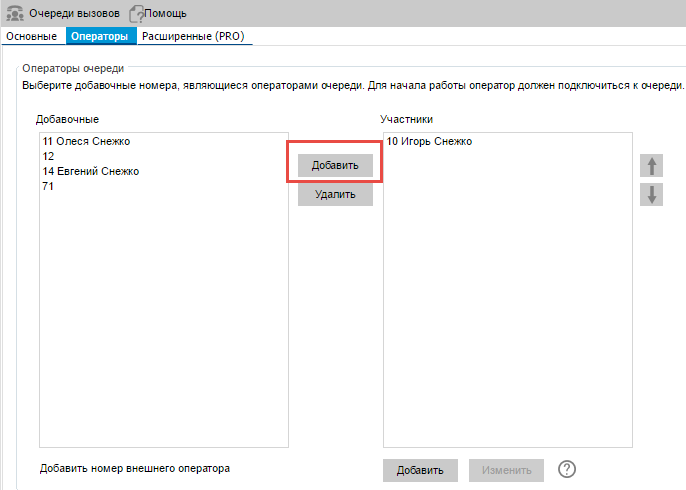
The Q button in the operator’s 3CXPhone interface connects and disconnects the operator to / from all the queues to which it is connected. If the operator is disconnected from the queues ( Queue Log Off is the default state of the new operator), the letter Q is gray. If connected, the letter Q has white or blue color depending on the used theme.
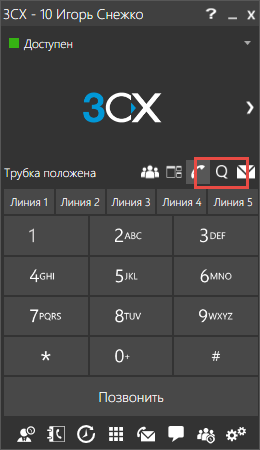
IP hardware phones, of course, do not have a special button for working with queues, however, using the 3CX Phone System, you can configure the BLF buttons of the IP phone to enter and exit to / from the Queue.
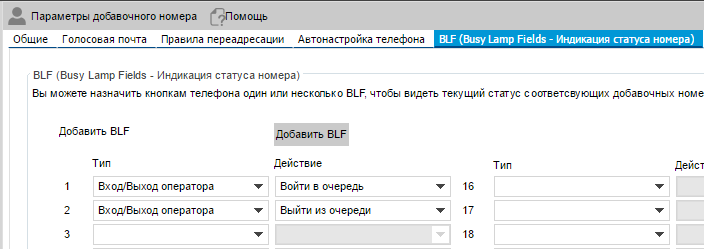
After the autotune procedure, the BLF buttons of the IP phone console will look like this.
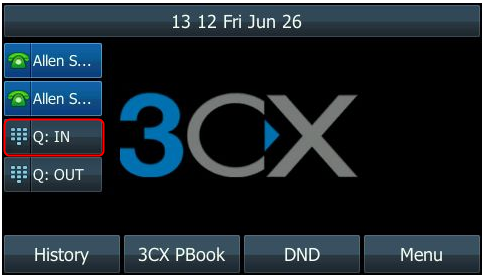
When you press the buttons, you will hear the voice confirmation “This extension has entered the queue” or “This extension has left the queue”.
If you use a simple IP phone without BLF buttons or an analog phone connected via an FXS gateway, you can use special dialcodes that are configured by the 3CX administrator in the PBX section of the Dialcodes tab .
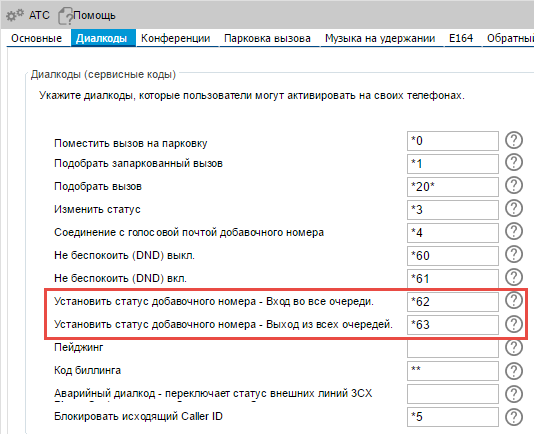
By default, the Entry to Queues is dial code * 62 , and output is * 63 . If necessary, you can change these values.

Depending on the onset of working / non-working hours or lunch break, the status of the user may automatically change. Working hours are configured globally for the entire organization, however, you can specify the individual working hours of a particular employee.
Of course, the operator can change their status manually.
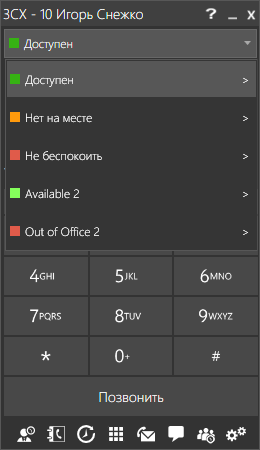
If the user’s status changes automatically or manually, you can configure simultaneous connection / disconnection to / from all Queues. In other words, participation in the call processing process will be synchronized with the actual working status of the employee-operator. To do this, the 3CX administrator must enable the corresponding options in the user properties in the Business Hours Schedule section.
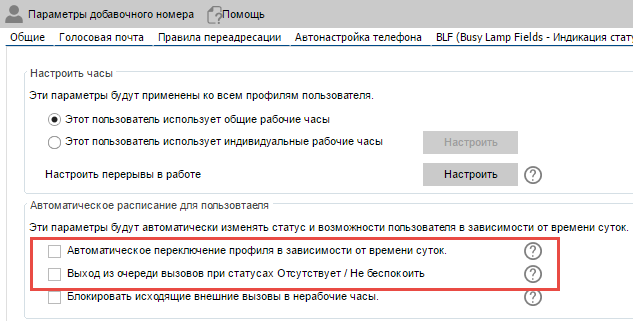
Another interesting opportunity to automatically change the status of the user is to track his work with the mouse and keyboard. If the employee does not use them for a certain time, this means that he has moved away from the computer, but forgot to switch his status. The problem is that at this time it can receive calls from the queue, and the call distribution algorithm waits for the operator to respond for a while, by default, 20 seconds. Thus, calls will be “stuck” for the absent operator, and the total service time will increase. In order to avoid such a situation and eliminate the human factor, it is recommended to set the automatic status change to Offline , in the absence of user activity.
In 3CXPhone for Windows, go to Settings - Account Settings - Your Account - Advanced - Automatically change status status during inactivity .
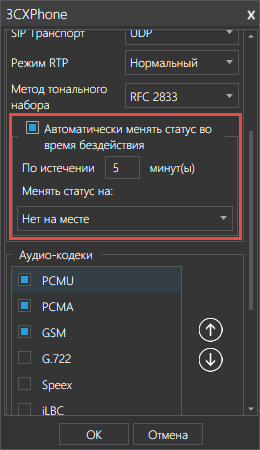
Now, if the operator has moved away from the computer and has not switched his status, he will be automatically disconnected from the Queue after 5 minutes.
The 3CX administrator can allow the user access to the settings of his own number. This is done in the settings of the extension in the Parameters tab.
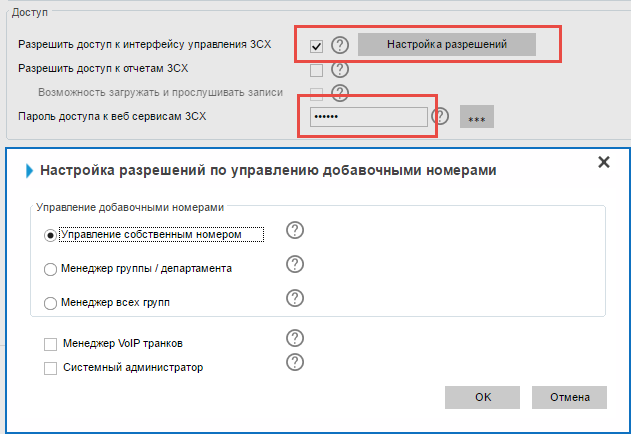
By specifying your phone number as a login, and the password for accessing 3CX web services as a password, the user can independently, without a 3CXPhone client, change their status in the Other tabs of the 3CX Phone System web interface.
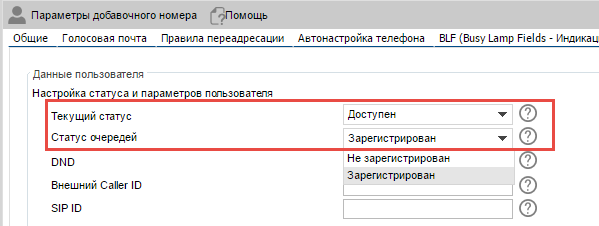
Warning: using all of the above methods, the user enters or exits from all Call Queues simultaneously .
If you are working simultaneously in multiple queues, you can disconnect or connect to a specific queue, depending on current tasks or Queues loading. This can be done from the Operator Panel 3CXPhone, which opens when you click on the icon in 3CXPhone. In any Operator Panel view where queues are available, go to the desired queue, right-click on your name and select the required action.
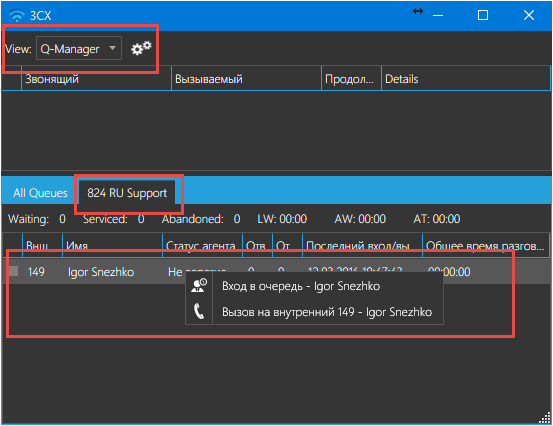
An employee who is assigned to the queue manager in the 3CX Phone System interface can connect and disconnect other queue operators.
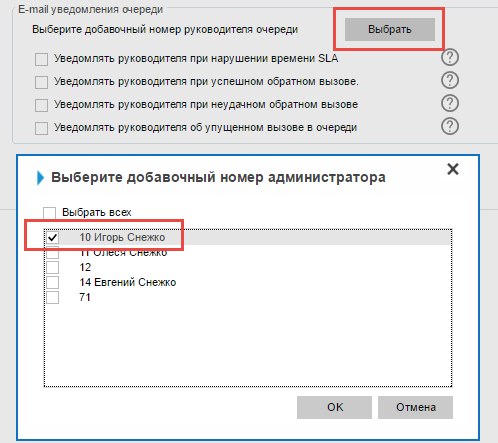
The procedure for connecting or disconnecting the operator is the same as above for self-connecting.
We looked at an important part of the work of the call center in the 3CX Phone System - managing the agents in the Call Queues. Additional information on the 3CX built-in call center is available at the following links:
At the moment, the call center is working on incoming calls and is implemented through the functionality of the Call Queues. An agent group is connected to each Call Queue, and a single agent can be connected to one or more queues. Incoming calls are distributed between operators as they become available. If all operators are busy, the subscriber will wait on the line (you can specify the maximum waiting time, the excess of which will be considered a violation of the quality of service). While waiting, subscribers can play a welcome message, music, or offer to order a callback from the Queue.
In this guide, we will look at various ways to connect and disconnect call center operators to the Call Queue.
')
Adding agents to the queue
Perhaps for many it will be obvious, but it is worth recalling that first of all you have to go to the settings of the Queue and add those operators who will serve it.

Q button in 3CXPhone
The Q button in the operator’s 3CXPhone interface connects and disconnects the operator to / from all the queues to which it is connected. If the operator is disconnected from the queues ( Queue Log Off is the default state of the new operator), the letter Q is gray. If connected, the letter Q has white or blue color depending on the used theme.

BLF buttons on IP phone
IP hardware phones, of course, do not have a special button for working with queues, however, using the 3CX Phone System, you can configure the BLF buttons of the IP phone to enter and exit to / from the Queue.

After the autotune procedure, the BLF buttons of the IP phone console will look like this.

When you press the buttons, you will hear the voice confirmation “This extension has entered the queue” or “This extension has left the queue”.
Dialcodes
If you use a simple IP phone without BLF buttons or an analog phone connected via an FXS gateway, you can use special dialcodes that are configured by the 3CX administrator in the PBX section of the Dialcodes tab .

By default, the Entry to Queues is dial code * 62 , and output is * 63 . If necessary, you can change these values.

Time of day and current user status
Depending on the onset of working / non-working hours or lunch break, the status of the user may automatically change. Working hours are configured globally for the entire organization, however, you can specify the individual working hours of a particular employee.
- During working hours, user status is set to Available
- During the non-working hours the user status - Do not disturb
- During the lunch break user status - None
Of course, the operator can change their status manually.

If the user’s status changes automatically or manually, you can configure simultaneous connection / disconnection to / from all Queues. In other words, participation in the call processing process will be synchronized with the actual working status of the employee-operator. To do this, the 3CX administrator must enable the corresponding options in the user properties in the Business Hours Schedule section.
- Status Available connects the operator to all Queues.
- Do Not Disturb or Missing status disables the operator from all Queues.

No user activity
Another interesting opportunity to automatically change the status of the user is to track his work with the mouse and keyboard. If the employee does not use them for a certain time, this means that he has moved away from the computer, but forgot to switch his status. The problem is that at this time it can receive calls from the queue, and the call distribution algorithm waits for the operator to respond for a while, by default, 20 seconds. Thus, calls will be “stuck” for the absent operator, and the total service time will increase. In order to avoid such a situation and eliminate the human factor, it is recommended to set the automatic status change to Offline , in the absence of user activity.
In 3CXPhone for Windows, go to Settings - Account Settings - Your Account - Advanced - Automatically change status status during inactivity .

Now, if the operator has moved away from the computer and has not switched his status, he will be automatically disconnected from the Queue after 5 minutes.
3CX control interface
The 3CX administrator can allow the user access to the settings of his own number. This is done in the settings of the extension in the Parameters tab.

By specifying your phone number as a login, and the password for accessing 3CX web services as a password, the user can independently, without a 3CXPhone client, change their status in the Other tabs of the 3CX Phone System web interface.

Warning: using all of the above methods, the user enters or exits from all Call Queues simultaneously .
Entry and exit to / from a specific Call Queue (3CX Pro Edition)
Alone through the Operator Panel 3CXPhone for Windows
If you are working simultaneously in multiple queues, you can disconnect or connect to a specific queue, depending on current tasks or Queues loading. This can be done from the Operator Panel 3CXPhone, which opens when you click on the icon in 3CXPhone. In any Operator Panel view where queues are available, go to the desired queue, right-click on your name and select the required action.

Queue Manager through the Operator Panel 3CXPhone for Windows
An employee who is assigned to the queue manager in the 3CX Phone System interface can connect and disconnect other queue operators.

The procedure for connecting or disconnecting the operator is the same as above for self-connecting.
Conclusion
We looked at an important part of the work of the call center in the 3CX Phone System - managing the agents in the Call Queues. Additional information on the 3CX built-in call center is available at the following links:
Source: https://habr.com/ru/post/279159/
All Articles